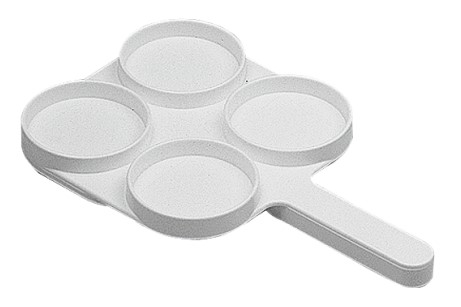Shalma: An Effective Tool for the Diagnosis of Mastitis in Dairy Animals
Shalma: An Effective Tool for the Diagnosis of Mastitis in Dairy Animals
Mastitis remains a major problem in the dairy industry, affecting the quality and quantity of milk produced. In this fight against the disease, innovative veterinary equipment such as the Schalm test plays an important role. Developed in Germany, this diagnostic technique allows veterinarians to quickly identify mastitis in its early stages, providing effective prevention and treatment measures.
Description of Shalm's Test
The Schalm test is a white plate equipped with four cups designed to analyze milk samples from each quarter of the udder. The procedure is carried out before each milking, which ensures regular monitoring of the health status of dairy animals.
Operating principle
1.Expressing Samples
Before milking, the first few streams of milk from each teat are expressed into appropriate cups on the plate.
2.
Adding Reagent
A special reagent is added to each bowl and mixed with milk. The reagent has properties that make it possible to identify signs of mastitis.
3.Identifying Symptoms
The active components of the reagent allow veterinarians to determine the symptoms of mastitis by the color of the liquid mass and the presence of clots in it.
Benefits of the Shalma Test
1.
Early Detection
The Shalm test provides early detection of signs of mastitis, which allows you to quickly respond and take the necessary treatment measures.
2.Efficiency and Ease of Use
The procedure does not require special skills and is easily implemented in the daily practice of caring for dairy animals.
3.
Health Monitoring
Regular use of the Shalma test provides constant monitoring of udder health, which is important for preventing possible problems.
4.Available Options
The Shalma sample is offered in two colors - white and black, which provides the user with a choice depending on preferences and working conditions.
Finally*
The Schalm test is becoming an important tool in the modern dairy farmer's arsenal. It is not only a diagnostic tool, but also a step towards effective health management of dairy animals, ensuring consistency and quality in milk production.
Read together with it:
- Krupko explained what groundwork has been laid for the development of the agro-industrial complex in the Gomel region for the next five years.January 7, Gomel. The results of the Gomel Region's agro-industrial complex in 2025 will provide a strong foundation for the industry's development in the near future. Gomel Regional Executive Committee Chairman Ivan Krupko expressed this confidence in a conversation with journalists and addressed President Alexander Lukashenko, BelTA reports. The Gomel Regional Executive Committee Chairman report...
- The highlights of 2025: what will we remember most about it?123 Last year was full of significant news and events. It began with the Belarusian presidential election. The entire country celebrated the 80th anniversary of the Great Victory and decided how Belarus would develop over the next five years. Schools, kindergartens, and medical facilities opened, roads and bridges were built, squares and parks were improved... Hundreds of moments daily made our co...
- Belousov from the Center for Macroeconomic Analysis and Short-Term Forecasting (CMASF) described the business model as "like the 90s, but for the benefit of society."After the introduction of sanctions in 2022, the "unexpected story" was that adaptation took place largely not at the expense of "the sovereign's people," but at the expense of "a layer of young entrepreneurs," says Dmitry Belousov, head of the Center for Macroeconomic Analysis and Short-Term Forecasting (CMASF).The Russian economy's strengths include its ability to withstand sanctions, some parts...
- Speech by President Lukashenko at the second session of the Seventh All-Belarusian People's AssemblyAlexander Lukashenko Topic News Time for Action. Speech by President Alexander Lukashenko at the Second Session of the Seventh All-Belarusian People's Assembly during his Address to the Belarusian People and the National Assembly Dear compatriots! Esteemed delegates of the All-Belarusian People's Assembly! Invited guests! Since the economy is the foundation of our lives, I warn you right away that...





























































